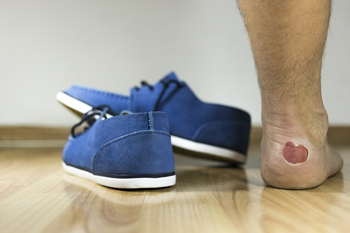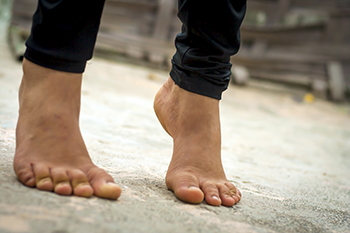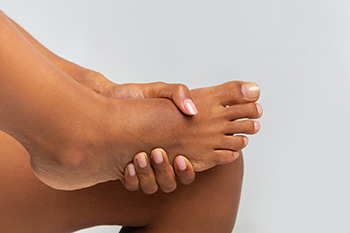Items filtered by date: December 2022
Infected Blisters

There are several different types of blisters that can develop on the human foot for a variety of reasons. One of the most common kinds of blisters develops in response to friction or pressure. Sometimes, this kind of blister will develop due to an ill-fitting new pair of shoes and the rubbing it entails. If you are not careful, a blister can become infected. Infected blisters can be potentially uncomfortable and should not be taken lightly. You might be able to tell if you have an infected blister by how the blister looks. For example, an infected blister can often become filled with pus that is green or yellow in color. Importantly, the entire area on the foot that surrounds the blister might become red and even warm to the touch. Redness and a raised temperature are tell-tale signs of an infected blister. If you have any questions about infected blisters, contact a podiatrist today for more information.
Blisters are prone to making everyday activities extremely uncomfortable. If your feet are hurting, contact the foot specialists of Podiatry Associates of Belleville. Our doctors can provide the care you need to keep you pain-free and on your feet.
Foot Blisters
Foot blisters develop as a result of constantly wearing tight or ill-fitting footwear. This happens due to the constant rubbing from the shoe, which can often lead to pain.
What Are Foot Blisters?
A foot blister is a small fluid-filled pocket that forms on the upper-most layer of the skin. Blisters are filled with clear fluid and can lead to blood drainage or pus if the area becomes infected.
How Do Blisters Form?
Blisters on the feet are often the result of constant friction of skin and material, usually by shoe rubbing. Walking in sandals, boots, or shoes that don’t fit properly for long periods of time can result in a blister. Having consistent foot moisture and humidity can easily lead to blister formation.
Prevention & Treatment
It is important to properly care for the affected area in order to prevent infection and ease the pain. Do not lance the blister and use a Band-Aid to provide pain relief. Also, be sure to keep your feet dry and wear proper fitting shoes. If you see blood or pus in a blister, seek assistance from a podiatrist.
If you have any questions, please feel free to contact our office located in Belleville, NJ . We offer the newest diagnostic and treatment technologies for all your foot care needs.
Excess Weight on the Feet May Lead to Foot Conditions

Research has shown the majority of women enjoy buying shoes but are unhappy with the way their feet look. Obesity may be a reason for this, and the feet may change shape as a result of the extra weight they endure. Additionally, the feet may become bigger, and many people have not purchased larger shoes to accommodate their feet. This can cause various foot problems to develop, including corns, bunions, and hammertoes. There are several warning signs the feet and legs may give which may indicate there is excess weight. These can consist of calf pain, possibly leading to Achilles tendonitis. Plantar fasciitis is a painful foot condition among obese patients, and severe heel pain may accompany this condition. Gout is an ailment that affects the toes and can cause debilitating pain. This is known to be common among people who are overweight and may be connected to kidney disease. If you have foot conditions from being overweight and would like to know about effective treatment and prevention methods, please confer with a podiatrist.
Obesity has become very problematic at this point in time and can have extremely negative effects on the feet. If you’re an obese individual and are concerned about your feet, contact the foot specialists from Podiatry Associates of Belleville. Our doctors can provide the care you need to keep you pain-free and on your feet.
Obesity and Your Feet
Since your feet are what support your entire weight when standing, any additional weight can result in pain and swelling. Being overweight is one of the main contributors to foot complications.
Problems & Complications
Extra Weight – Even putting on just a few extra pounds could create serious complications for your feet. As your weight increases, your balance and body will shift, creating new stresses on your feet. This uneven weight distribution can cause pain, even while doing the simplest tasks, such as walking.
Diabetes – People who are overweight are at serious risk of developing type-2 diabetes, which has a drastic impact on the health of your feet. As you get older, your diabetes might worsen, which could lead to loss of feeling in your feet, sores, and bruises. You could also become more prone to various infections.
Plantar fasciitis – Pressure and stress that is placed on muscles, joints, and tendons can trigger plantar fasciitis, which is an inflammation of tissue that forms along the bottom of the foot.
If you have any questions please feel free to contact our office located in Belleville, NJ . We offer the newest diagnostic and treatment technologies for all your foot and ankle needs.
Causes of Burning Feet Syndrome

A burning sensation in the feet, especially at night, may indicate certain serious underlying conditions that should not be ignored. One of the main causes of burning feet is peripheral neuropathy, nerve damage that is common among diabetics. Neuropathy also may be the result of overconsumption of alcohol or a deficiency in B vitamins, as well as other conditions. When the nerves in the lower extremities are damaged, they send mixed signals to the feet that generate a burning sensation. Peripheral artery disease is another cause of burning feet. Poor circulation to the feet can trigger pain, tingling and burning, especially when walking. Burning generally starts in the sole of the foot and travels upward toward the ankle. Symptoms usually worsen at night. Treatment for burning feet starts with eliminating the causes, the most common of which are high blood sugar and extreme use of alcohol. Certain medications are available that can help to alleviate symptoms of burning feet. If burning feet are inhibiting your daily life, it is a good idea to consult a podiatrist for an examination, a diagnosis, and treatment options that are best for you.
Foot Pain
Foot pain can be extremely painful and debilitating. If you have a foot pain, consult with the foot specialists from Podiatry Associates of Belleville. Our doctors will assess your condition and provide you with quality foot and ankle treatment.
Causes
Foot pain is a very broad condition that could be caused by one or more ailments. The most common include:
- Bunions
- Hammertoes
- Plantar Fasciitis
- Bone Spurs
- Corns
- Tarsal Tunnel Syndrome
- Ingrown Toenails
- Arthritis (such as Gout, Rheumatoid, and Osteoarthritis)
- Flat Feet
- Injury (from stress fractures, broken toe, foot, ankle, Achilles tendon ruptures, and sprains)
- And more
Diagnosis
To figure out the cause of foot pain, podiatrists utilize several different methods. This can range from simple visual inspections and sensation tests to X-rays and MRI scans. Prior medical history, family medical history, and any recent physical traumatic events will all be taken into consideration for a proper diagnosis.
Treatment
Treatment depends upon the cause of the foot pain. Whether it is resting, staying off the foot, or having surgery; podiatrists have a number of treatment options available for foot pain.
If you have any questions, please feel free to contact our office located in Belleville, NJ . We offer the newest diagnostic and treatment technologies for all your foot care needs.
What Is Synovitis?

Synovitis is inflammation of the tissues that line a joint. Those with gout or another form of arthritis may be at risk for synovitis. It is also a result of overuse or trauma to a joint. Symptoms include redness, swelling, warmth, and pain with joint motion. Since pain or synovitis might mimic that of other afflictions, like fractures or infections, it is important to see a podiatrist and have the feet evaluated. Treatment often includes rest, immobilization, and medications. Surgery may be necessary for synovitis that has persisted. If you feel pain in your feet and ankle joints, see a podiatrist to get a proper diagnosis and learn about treatment options.
Some foot conditions may require additional professional care. If you have any concerns, contact the foot specialists of Podiatry Associates of Belleville. Our doctors can provide the care you need to keep you pain-free and on your feet.
Rare Foot Conditions
The majority of foot conditions are common and can be treated by a podiatrist. Standard diagnostic procedures are generally used to identify specific conditions and treatment can be rendered. A podiatrist also treats rare foot conditions which can be difficult to diagnose and may need extra attention and care.
There are many rare foot conditions that can affect children. Some of these can include:
- Freiberg’s disease
- Kohler’s disease
- Maffucci syndrome
Freiberg’s disease - This can be seen as a deterioration and flattening of a metatarsal bone that exists in the ball of the foot. It typically affects pre-teen and teenage girls, but can affect anyone at any age. Symptoms that can accompany this can be swelling, stiffness, and the patient may limp.
Kohler’s disease - This often targets the bone in the arch of the foot and affects younger boys. It can lead to an interruption of the blood supply which ultimately can lead to bone deterioration. The patient may limp or experience tenderness, swelling, and redness.
Maffucci syndrome - This affects the long bones in a child’s foot leading to the development of abnormal bone lesions. They are benign growths and typically develop in early childhood and the bones may be susceptible to breaking.
A podiatrist can properly diagnose and treat all types of rare foot conditions. If your child is affected by any of these symptoms or conditions, please don’t hesitate to call our office so the correct treatment method can begin.
If you have any questions please feel free to contact our office located in Belleville, NJ . We offer the newest diagnostic tools and technology to treat your foot and ankle needs.
